
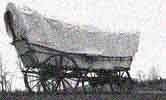
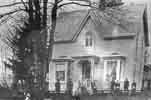
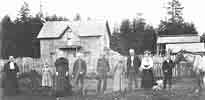
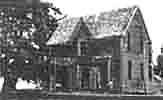
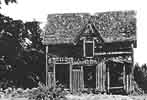
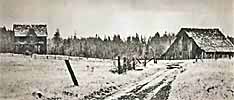
| Home |
| Early Life |
| Maps |
| Oregon
Laws |
| The
Trail |
| Bush
Biography |
| Tumwater
Born |
| Thurston
County |
| State
History |
| Bush
Farm Today |
| FAQs |
| Timeline |
|
The
fourth train of 1844 left from St.
Joseph, Missouri. Before it was
fully formed it was reported that
this train contained 48 families,
108 men (60 of whom were young
men), 323 persons, 410 oxen, 160
cows (16 of which were team cows),
143 young cattle, 54 horses, 11
mules, and 72 wagons. The number
of horned cattle was 713. At the
time of the census many men from
adjoining counties were still
expected. See
more about General Gilliam's train here
- Reminiscences
of 1844
by T.C. Shaw More about Captain Shaw here - Oregon Territory magazine January 9, 1977 Hubert Bancroft's discussion of the wagon train led by General Cornelius Gilliam (Bancroft's work is questionable) The inducement to go to Oregon was not lessened by the prospect of having to drive out the nation which had been fought at New Orleans and along the border, and a large number of people [Note 1] collected at different points along the Missouri River, amounting in all to fourteen hundred persons. The company which rendezvoused near Weston, at a place called Capler's landing, was led by Cornelius Gilliam, who had conceived the idea of an independent colony, as best suited his fancy and the temper of the men. The leaders of 1844 were hardly equal to those of the previous year. Nor by saying this do I mean any disrespect. They were brave, loyal, earnest, but better fitted to execute than to command; to be loyal to a government than to construct one. Their tendencies were more toward military glory than pride of statesmanship. This spirit led them to organize under military rules for their journey to the Columbia, and to elect a set of officers sufficient for an army, with Gilliam as general. Little is known of Gilliam's antecedents. He was brave, obstinate, impetuous, and generous, with good natural abilities, and but little education. His accomplishments were varied; he had served in the Black Hawk war, and also in the Seminole war in Florida, as captain; he had preached the gospel of Christ; he had been sheriff of a county, and had served in the Missouri legislature. He was, indeed, just the robust, impulsive, sympathetic, wilful, and courageous leader the men of the border would choose. His aid was John Inyard [Note 2]. The colonel of the organization was Michael T. Simmons, uneducated, but brave and independent, who sought in emigration to Oregon recovery of fortune and health. Four captains were elected under Gilliam: R. W. Morrison, William Shaw, Richard Woodcock and Elijah Bunton [Note 3]. Instead of a judge advocate, with that instinct toward civil liberties which characterized the frontiersman, a court of equity was established by the election of a judge, with two associate justices [Note 4]. But the court was inoperative, martial law prevailing during the maintenance of military discipline [Note 5]. When the independent colony reached the buffalo grounds, Gilliam used to dash off after the game, to the disappointment of those left in charge of the train. Speeches were made in camp on this subject, and some regulations were laid down for hunting, but they were not regarded; and as happened in 1843, when the Rocky Mountains had been passed, there was no longer any attempt to keep together in large companies. The other divisions, led by Nathaniel Ford, a man of character and influence, and John Thorp, appear not to have found it necessary to burden themselves with too many regulations, and progressed well without them. Moses Harris, well known in the mountains among the fur-traders and trappers as Black Harris, acted as guide. A company under Sublette also travelled with them from the Platte to Green River. The spring was unusually rainy. By the overflowing of streams, as well as the softening of the earth, so much time was lost that by the 1st of July not more than one hundred miles in a straight course had been travelled. Yet they did not suffer themselves to be discouraged, only one man out of Gilliam's command turning back. Two months of wet weather produced dysentery and rheumatism [Note 6]. The delay occasioned by storms was so much additional time in which provisions were being consumed; hence at Fort Laramie many families were already without flour, and compelled to purchase it at thirty and forty dollars a barrel. Sugar could be procured only at a dollar and a half a pint. The route from Green River to Fort Hall was the same opened the year before by way of Fort Bridger. Many were bitterly disappointed on reaching this point to be told they were then only half-way to their destination; and a small company of men without families abandoned their wagons two days west of this post, and prepared to travel with their horses only [Note 7]. They reached Fort Hall on the 10th of September, finding flour at this place too high for their means. Gilliam's wagons arrived here the 16th, where a letter awaited them from Barnett, advising them, if they were likely to need assistance before reaching the Columbia, to send word to the settlers. As it was manifest that assistance would be needed, a party of young men were sent forward on horses, who reached Oregon City on the 18th of October. These were John Minto [Note 8], Samuel B. Crockett, and Daniel Clark. According to Clyman, they encountered at the Grand Road James Waters of the previous emigration, who was going to meet his family, and who supplied them with provisions for the remainder of their journey [Note 9]. Ford's company, being in advance of Gilliam's, also sent three young men to the Willamette Valley with Minto's party. Snow had now begun to fall in the mountains, while a large part of the emigration was between Fort Boise and the Dalles. The misery entailed upon the belated travellers by the change to winter weather was indescribable [Note 10]. The road from Burnt River to the Dalles was a panorama of suffering and destitution, and the rear of the caravan remained at Whitman's over the winter. Shaw, who turned aside to Whitman's station to lay in provisions, left there a family of seven children named Sager, whose parents had died on the road, the father while the company was at Green River, and the mother two weeks later. These children were adopted by Dr. Whitman. Shaw failed to reach the Willamette that season, as some of his family were prostrated by sickness, and he remained until March 1845 at the Dalles, with several other families [Note 11]. Two or more small mounted parties, the first to reach the Dalles, took the cattle trail round the base of Mount Hood, and arrived safely in the valley. But the later comers feared this route on account of the advanced season. The families were assisted in descending the Columbia by the loan of boats belonging to the Hudson's Bay Company; and the cattle were crossed by swimming to the north side of the river, driven down to Vancouver, and recrossed in boats, as they had been the previous year. The scenes of suffering at the Cascades in 1843 were repeated in 1844. Minto, who it will be remembered hastened to the Willamette for help for his employer and friends, tells us that on returning with a boatload of provisions to the Cascades he found 'men in the prime of life lying among the rocks seeming ready to die. I found there mothers with their families, whose husbands were snow-bound in the Cascade Mountains, without provisions and obliged to kill and eat their game dogs. Mrs. Morrison had traded her only dress except the one she wore for a bag of potatoes. There was scarcely a dry day, and the snowline was nearly down to the river. In such a plight did the immigration of 1844, which set out with high hopes to plant an independent colony in Oregon, find itself on reaching the promised land. The loss of life had been light notwithstanding the hardships of the journey [Note 12]; but the loss of property in cattle, clothing, and household and other goods had been great, to the ruin of many. The cattle had become fat during the weeks of detention on the grassy plains, and were unfit for the hard work of hauling loaded wagons for the remainder of the summer. Many died of exhaustion; some were taken by the natives, who, although not in open hostility, were troublesome at several places on the route, at the Kansas agency, at Laramie, in the Cayuse country, and on the Columbia [Note 13]; although White had deputized A. G. Lee to be among the Cayuses during the passage of the immigration, and to assist in the purchase of cattle with the ten-dollar drafts mentioned in the previous chapterĐa device which proved unsuccessful, as the immigrants preferred their cattle to the drafts. The natives were able, however, to sell their crops to the immigrants for good prices, by exchanging wheat, corn, and potatoes for clothing and other articles. Not being able to buy cattle, they stole them [Note 14]; and unable to purchase American horses with their less valuable ponies, they stole those also, until the immigrants, losing patience, retaliated, and took Indian horses regardless of individual ownership; and the evil consequences which were likely to fall upon the next immigration; savages being like civilized men in this respect, that they are ready to punish misconduct in others for which in themselves they find ample excuse. The condition of the immigrants of 1844, after they had passed all the perils of the journey to Oregon, was worse than that of 1843, for the reason that there had not been time for the country to recover from the draft upon its resources made the year previous. Thanks to the fertility of the soil, and to the good judgement of McLoughlin in encouraging farming, there was food enough for all, though many lived on short rations rather than incur debt. But the great want of the new-comers was clothing. All the goods in the several stores had long been exhausted; even at Vancouver there was no stock on hand, except the reserved cargo, which was not opened when the immigration arrived [Note 15]. Clothing was made by putting piece to piece without regard to color or texture; and moccasins, which took the place of boots and shoes, were the almost universal foot-covering. A tannery had been begun in the summer, in the neighborhood of Burnett's farm, but the autumn supply of leather, besides being inadequate, was only half tanned, and had a raw streak in the centre. This destitution, while there was a year's supply in the warehouses at Vancouver, occasioned complaints on the part of the less reasonable of the immigrants who were unable to see why they should not receive as many favors from the Hudson's Bay Company as those of the previous year had, under the same circumstances. McLoughlin had, with his usual sagacity, foreseen that there would be this feeling, and while prepared to defend the company's property from pillage in case of a collision with the immigrants, sought by every means to cultivate a friendly feeling. Minto relates that when Gilliam was at the Dalles he received a present of food and clothing from the gentlemen at Vancouver; and remarks that although kindly meant, it was a mistake on the part of the company, as it led to the discussion of subjects connected with the politics of the country, which were being forgotten in their more present anxieties, and to a great deal of gossip concerning the meaning of the recent action of the company in strengthening their defences, of which they had been informed, and also of the visit of the "Modeste." These conversations were so frequent that the naturally generous Gilliam, whose prejudices were becoming softened, was led to declare at the Cascades that although willing to live in peace with the Hudson's Bay Company so long as they kept within their treaty rights he would have no hesitation in knocking their stockade about their ears if they did not carry themselves properly. But it would have been strange if the generous assistance which extended to everything except opening their storehouses against rules and without pay, and the untiring courtesy of McLoughlin and his associate, Douglas, could not have removed many of the preconceived and ill-founded notions of these western Americans [Note 16]. But the conflict which impended it was impossible to avoid by anything less than an admission that to the United States belonged the whole of Oregon, and that the company occupied the country temporarily under a convention which could be annulled at any time đ an admission they were not prepared to make until instructed by the British government to do so. McLoughlin was very desirous that the immigration should find homes south of the Columbia River; first, because he believed that was their proper place of settlement, under and American form of government; but principally, as he alleged, because contact with the free and independent frontier men would destroy the spirit of obedience for which the company's servants were remarkable, and on which the success and prosperity of the company depended. To his great dissatisfaction, a considerable number encamped for the winter at Washougal, about seventeen miles above Vancouver, on the north bank of the river. They were some of those most thoroughly imbued with the Bentonian idea of American proprietorship, and soon found means of expressing that idea according to their several natures. Elwood Evans states that Michael T. Simmons and his company, who were among those at Washougal, had first designed to settle in the Rogue River Valley; but that finding McLoughlin anxious to have the Americans settle on the south side of the Columbia, determined to locate himself and company on the north side of the river. According to Evans, who had means of obtaining his information from Simmons himself, the latter, after deciding to take a look at the Puget Sound region, applied to McLoughlin to furnish his family winter quarters in the fort; the request was refused unless he would agree to live on the south side of the river - a promise which Simmons would not give. A cabin outside the fort was finally obtained, and his family established in its shelter, when Simmons set out for Puget Sound, accompanied by Henry Williamson, Henry, James, and John Owens, and James Lewis. They proceeded no further than the forks of the Cowlitz River, sixteen miles north of the Columbia, when finding their provisions becoming exhausted, and the journey excessively difficult, owing both to the nature of the country and the severe weather, they returned to Washougal, where they passed the remainder of the winter and the first part of summer in making shingles, which they sold to the fur companies, or in any employment they could find to pay expenses. |